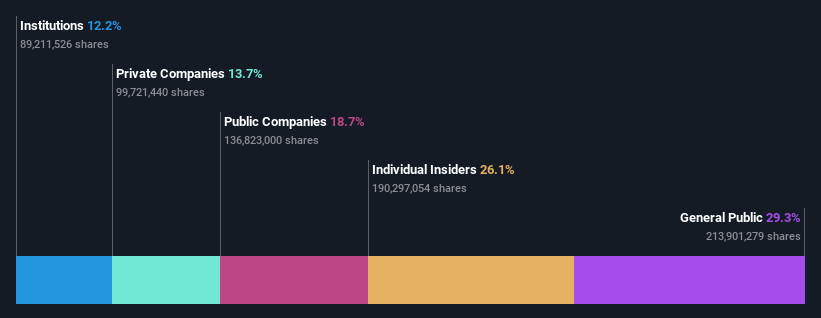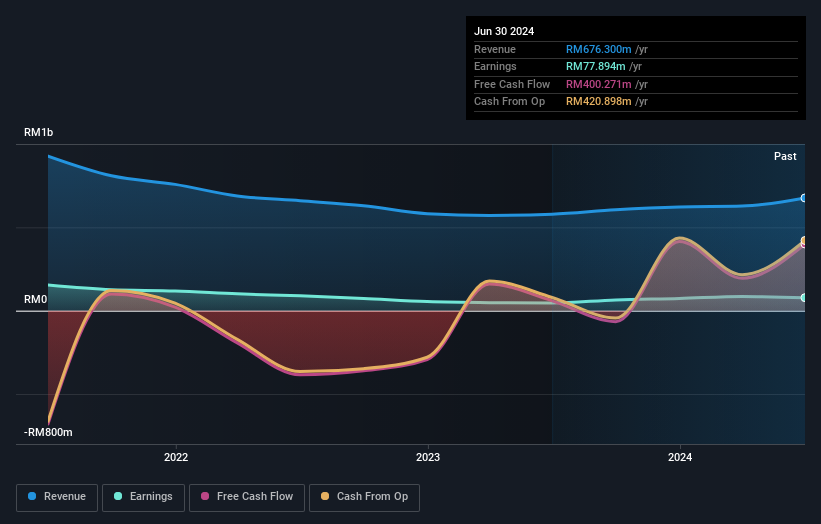- Malaysia
- /
- Capital Markets
- /
- KLSE:KENANGA
Kenanga Investment Bank Berhad's (KLSE:KENANGA) stock price dropped 11% last week; retail investors would not be happy

Key Insights
- The considerable ownership by retail investors in Kenanga Investment Bank Berhad indicates that they collectively have a greater say in management and business strategy
- 52% of the business is held by the top 8 shareholders
- 26% of Kenanga Investment Bank Berhad is held by insiders
If you want to know who really controls Kenanga Investment Bank Berhad (KLSE:KENANGA), then you'll have to look at the makeup of its share registry. We can see that retail investors own the lion's share in the company with 29% ownership. In other words, the group stands to gain the most (or lose the most) from their investment into the company.
While insiders who own 26% came under pressure after market cap dropped to RM766m last week,retail investors took the most losses.
In the chart below, we zoom in on the different ownership groups of Kenanga Investment Bank Berhad.
See our latest analysis for Kenanga Investment Bank Berhad

What Does The Institutional Ownership Tell Us About Kenanga Investment Bank Berhad?
Institutions typically measure themselves against a benchmark when reporting to their own investors, so they often become more enthusiastic about a stock once it's included in a major index. We would expect most companies to have some institutions on the register, especially if they are growing.
We can see that Kenanga Investment Bank Berhad does have institutional investors; and they hold a good portion of the company's stock. This implies the analysts working for those institutions have looked at the stock and they like it. But just like anyone else, they could be wrong. It is not uncommon to see a big share price drop if two large institutional investors try to sell out of a stock at the same time. So it is worth checking the past earnings trajectory of Kenanga Investment Bank Berhad, (below). Of course, keep in mind that there are other factors to consider, too.

Hedge funds don't have many shares in Kenanga Investment Bank Berhad. Cahya Mata Sarawak Berhad is currently the largest shareholder, with 19% of shares outstanding. With 9.5% and 4.7% of the shares outstanding respectively, Tengku Noor Zakiah Family Trust and Tokai Tokyo Asset Management Co., Ltd. are the second and third largest shareholders. Furthermore, CEO Chay Leong is the owner of 0.9% of the company's shares.
We also observed that the top 8 shareholders account for more than half of the share register, with a few smaller shareholders to balance the interests of the larger ones to a certain extent.
Researching institutional ownership is a good way to gauge and filter a stock's expected performance. The same can be achieved by studying analyst sentiments. As far as we can tell there isn't analyst coverage of the company, so it is probably flying under the radar.
Insider Ownership Of Kenanga Investment Bank Berhad
The definition of an insider can differ slightly between different countries, but members of the board of directors always count. The company management answer to the board and the latter should represent the interests of shareholders. Notably, sometimes top-level managers are on the board themselves.
I generally consider insider ownership to be a good thing. However, on some occasions it makes it more difficult for other shareholders to hold the board accountable for decisions.
Our most recent data indicates that insiders own a reasonable proportion of Kenanga Investment Bank Berhad. It has a market capitalization of just RM766m, and insiders have RM200m worth of shares in their own names. This may suggest that the founders still own a lot of shares. You can click here to see if they have been buying or selling.
General Public Ownership
The general public-- including retail investors -- own 29% stake in the company, and hence can't easily be ignored. This size of ownership, while considerable, may not be enough to change company policy if the decision is not in sync with other large shareholders.
Private Company Ownership
It seems that Private Companies own 14%, of the Kenanga Investment Bank Berhad stock. Private companies may be related parties. Sometimes insiders have an interest in a public company through a holding in a private company, rather than in their own capacity as an individual. While it's hard to draw any broad stroke conclusions, it is worth noting as an area for further research.
Public Company Ownership
We can see that public companies hold 19% of the Kenanga Investment Bank Berhad shares on issue. It's hard to say for sure but this suggests they have entwined business interests. This might be a strategic stake, so it's worth watching this space for changes in ownership.
Next Steps:
I find it very interesting to look at who exactly owns a company. But to truly gain insight, we need to consider other information, too. Take risks for example - Kenanga Investment Bank Berhad has 1 warning sign we think you should be aware of.
Of course, you might find a fantastic investment by looking elsewhere. So take a peek at this free list of interesting companies.
NB: Figures in this article are calculated using data from the last twelve months, which refer to the 12-month period ending on the last date of the month the financial statement is dated. This may not be consistent with full year annual report figures.
Valuation is complex, but we're here to simplify it.
Discover if Kenanga Investment Bank Berhad might be undervalued or overvalued with our detailed analysis, featuring fair value estimates, potential risks, dividends, insider trades, and its financial condition.
Access Free AnalysisHave feedback on this article? Concerned about the content? Get in touch with us directly. Alternatively, email editorial-team (at) simplywallst.com.
This article by Simply Wall St is general in nature. We provide commentary based on historical data and analyst forecasts only using an unbiased methodology and our articles are not intended to be financial advice. It does not constitute a recommendation to buy or sell any stock, and does not take account of your objectives, or your financial situation. We aim to bring you long-term focused analysis driven by fundamental data. Note that our analysis may not factor in the latest price-sensitive company announcements or qualitative material. Simply Wall St has no position in any stocks mentioned.
About KLSE:KENANGA
Kenanga Investment Bank Berhad
Provides investment banking, stockbroking, and related financial services primarily in Malaysia.
Solid track record average dividend payer.
Market Insights
Community Narratives




